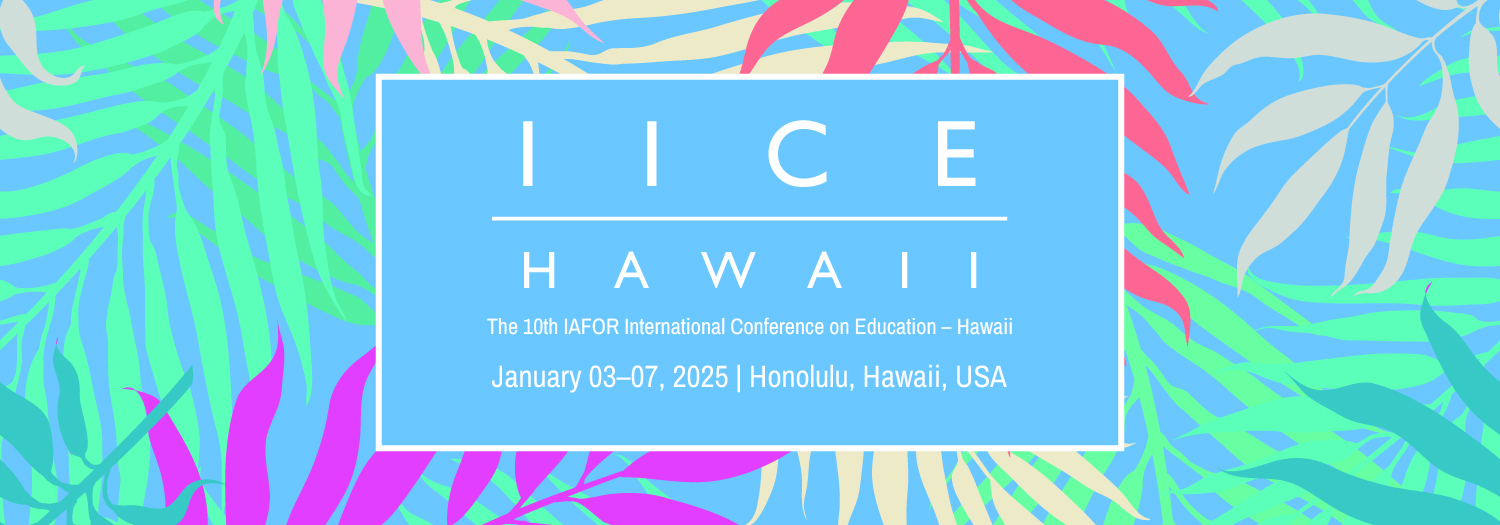The 10th IAFOR International Conference on Education in Hawaii

Join us in Honolulu (and online) for IICE2025
January 03-07, 2025 | The Hawai'i Convention Center, Honolulu, Hawaii, United States
 Aloha and welcome to the beautiful island of Oahu, home to The IAFOR International Conference on Education in Hawaii (IICE), and The IAFOR International Conference on Arts & Humanities in Hawaii (IICAH).
Aloha and welcome to the beautiful island of Oahu, home to The IAFOR International Conference on Education in Hawaii (IICE), and The IAFOR International Conference on Arts & Humanities in Hawaii (IICAH).
Held in partnership with the University of Hawaiʻi at Mānoa, this international conference encourages academics and scholars to meet and exchange ideas and views in a forum stimulating respectful dialogue, by bringing together university scholars working throughout Hawaii, the United States, Asia, and beyond to share ideas and research at the intersection of education and the arts and humanities. This event will afford an exceptional opportunity for renewing old acquaintances, making new contacts, networking, and facilitating partnerships across national and disciplinary borders.
 Since its founding in 2009, IAFOR has brought people and ideas together in a variety of events and platforms to promote and celebrate interdisciplinary study, and underline its importance. Over the past year we have engaged in many cross-sectoral projects, including those with universities (the University of Barcelona, Hofstra University, UCL, University of Belgrade and Moscow State University), think tanks (the East-West Center), as well as collaborative projects with the United Nations in New York, and the Government of Japan through the Prime Minister’s office, and right here in Honolulu with the University of Hawaiʻi at Mānoa for this conference!
Since its founding in 2009, IAFOR has brought people and ideas together in a variety of events and platforms to promote and celebrate interdisciplinary study, and underline its importance. Over the past year we have engaged in many cross-sectoral projects, including those with universities (the University of Barcelona, Hofstra University, UCL, University of Belgrade and Moscow State University), think tanks (the East-West Center), as well as collaborative projects with the United Nations in New York, and the Government of Japan through the Prime Minister’s office, and right here in Honolulu with the University of Hawaiʻi at Mānoa for this conference!
With the IAFOR Research Centre at the Osaka School of International Public Policy (OSIPP) at Osaka University, we have engaged in a number of interdisciplinary initiatives we believe will have an important impact on domestic and international public policy conversations. It is through conferences like these that we expand our network and partners, and we have no doubt that IICE2025 and IICAH2025 will offer a remarkable opportunity for the sharing of research and best practice, for the meeting of people and ideas. We expect the resultant professional and personal collaborations to endure for many years, and we look forward to seeing you in Honolulu!
The 10th IAFOR International Conference on Education in Hawaii (IICE2025) will be held alongside The 5th IAFOR International Conference on Arts & Humanities in Hawaii (IICAH2025), and many of the sessions will concentrate on areas at the intersection of education and the arts and humanities. In keeping with IAFOR’s commitment to interdisciplinary study, delegates at either conference are encouraged to attend sessions in other disciplines. Registration for either of these conferences permits attendance in both.
– The IICE2025 Conference Programme Committee
Dr Failautusi ‘Tusi’ Avegalio, University of Hawaiʻi at Mānoa, United States
Kālewa Correa, Smithsonian Institute, United States
Dr Joseph Haldane, The International Academic Forum (IAFOR), Japan
Professor Curtis Ho, University of Hawai’i at Manoa, United States
Dr Daniel Hoffman, University of Hawaii at Manoa, United States
Professor Barbara Lockee, Virginia Tech, United States
Professor James W. McNally, University of Michigan, United States & NACDA Program on Aging
Dr Alex Means, University of Hawaiʻi at Mānoa, United States
Professor Michael Menchaca, University of Hawaiʻi at Mānoa, United States
Professor Sela V. Panapasa, University of Michigan, United States
Tialei Scanlan, Brigham Young University – Hawaii, United States
Robin Watson, University of Hawaiʻi at Mānoa, United States
Dr Hiagi M. Wesley, Brigham Young University – Hawaii, United States
IAFOR Journal of Education (Scopus Indexed Journal)
 This conference is associated with the Scopus and DOAJ listed IAFOR Journal of Education.
This conference is associated with the Scopus and DOAJ listed IAFOR Journal of Education.
- Location & Venue: The Hawai’i Convention Center, Honolulu, Hawaii, United States (and online)
- Dates: Friday, January 03, 2025 to Tuesday, January 07, 2025
- Early Bird Abstract Submission Deadline: August 08, 2024*
- Final Abstract Submission Deadline: October 10, 2024
- Registration Deadline for Presenters: November 14, 2024
*Submit early to take advantage of the discounted registration rates. Learn more about our registration options.
Present, Publish, Participate Onsite or Online
For us at IAFOR, the global coronavirus pandemic has allowed us to reimagine the conference, respecting the best of both onsite and online engagement, and the integrity of each format, and while respecting the coherence of the conference offering previously unavailable opportunities for flexibility.
We will be as flexible as we can on our side to allow delegates to choose between registration types between “onsite” and “online” up until six weeks before the conference, so that you can be assured that whatever your situation, you can present, publish, and participate.
About IAFOR’s Education Conferences
IAFOR promotes and facilitates new multifaceted approaches to one of the core issues of our time, namely globalisation and its many forms of growth and expansion. Awareness of how it cuts across the world of education, and its subsequent impact on societies, institutions and individuals, is a driving force in educational policies and practices across the globe. IAFOR’s conferences on education have these issues at their core. The conferences present those taking part with three unique dimensions of experience, encouraging interdisciplinary discussion, facilitating heightened intercultural awareness and promoting international exchange. In short, IAFOR’s conferences on education are about change, transformation and social justice. As IAFOR’s previous conferences on education have shown, education has the power to transform and change whilst it is also continuously transformed and changed.
Globalised education systems are becoming increasingly socially, ethnically and culturally diverse. However, education is often defined through discourses embedded in Western paradigms as globalised education systems become increasingly determined by dominant knowledge economies. Policies, practices and ideologies of education help define and determine ways in which social justice is perceived and acted out. What counts as "education" and as "knowledge" can appear uncontestable but is in fact both contestable and partial. Discourses of learning and teaching regulate and normalise gendered and classed, racialised and ethnicised understandings of what learning is and who counts as a learner.
In many educational settings and contexts throughout the world, there remains an assumption that teachers are the possessors of knowledge which is to be imparted to students, and that this happens in neutral, impartial and objective ways. However, learning is about making meaning, and learners can experience the same teaching in very different ways. Students (as well as teachers) are part of complex social, cultural, political, ideological and personal circumstances, and current experiences of learning will depend in part on previous ones, as well as on age, gender, social class, culture, ethnicity, varying abilities and more.
IAFOR has several annual conferences on education across the world, exploring common themes in different ways to develop a shared research agenda which develops interdisciplinary discussion, heightens intercultural awareness and promotes international exchange.
About IAFOR
Founded in 2009, The International Academic Forum (IAFOR) is a politically independent non-partisan and non-profit interdisciplinary think tank, conference organiser and publisher. Based in Japan, its main administrative office is in Nagoya, and its research center is in The Osaka School of International Public Policy (OSIPP), a graduate school of Osaka University. IAFOR runs research programs and events in Asia, Europe and North America in partnership with universities and think tanks, and has also worked on a number of multi-sector cooperative programs and events, including collaborations with the United Nations and the Government of Japan.



